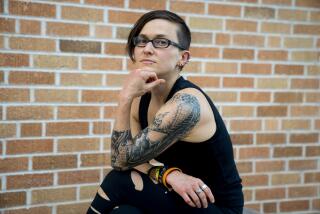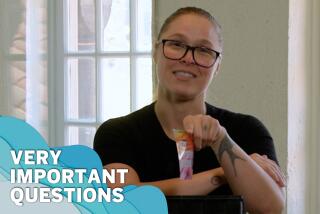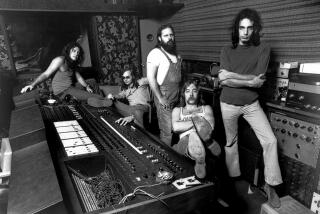Single laurel, common voice
Could there be an honorific less American-sounding than poet laureate? The title conjures images of a laurel wreath askew on the pale brow of a loitering bard -- scribbling couplets beside a throne (“I am his Highness’ dog at Kew; / Pray tell me, sir, whose dog are you?”) British poets laureate write occasional verse to celebrate royal birthdays, ship christenings and Tube station openings. As California’s new poet laureate, I haven’t been asked to write a sonnet or triolet in honor of Gov. Schwarzenegger, who appointed me last month, nor a pantoum in honor of Maria Shriver -- and I don’t expect to have to honor such a request. The governor and first lady clearly admire the idea of the poet laureate without insisting on a job description or the odd panegyric.
In Britain, the poet laureate remains a half-jester, half-noble figure. In the U.S., we remain “half-cracked,” as Emily Dickinson said. We have a poetry tradition -- a “Body Electric” anarchic romance -- which gives rise to our present poetry polyglot: neo-formalist, plain style, abstract, imagist, l-a-n-g-u-a-g-e, ethnic, feminist, mystical, abcderian, post-colonial, lyric-narrative or minimalist, William-Carlos-Williams-take-the-damn-refrigerator-note-down-and-mix- me-a-plum-daiquiri schools of poetry.
Poetry is, like prayer, spun from the imagination -- from ultimate contradiction -- like the idea of a democratic crown. Who’s lucky or brazen enough to wear this headgear? I’m brazen enough to bow my head and gratefully accept the honor. Born in Minnesota, I teach creative writing at the University of Southern California, have written books of poems and, for years, wrote a poetry review column for this newspaper. Our governor was born in Austria and his first lady was born into an American “royal” family sprung from Irish immigrants. Each of us, with our homegrown or immigrant souls, has an idea of what sort of poetry should come out of the state -- whether it should sound like Gary Snyder, Robinson Jeffers, Kenneth Rexroth or Robert Frost (born in San Francisco), or like Sor Juana, Carolyn Kizer, Jane Hirschfield, Marilyn Chin or Harryette Mullen. In a letter, Maria Shriver told me that California women are “trailblazers” in everything they do. I agree -- in particular about poets, those psychic pioneers.
There’s the answer, I think, to who or what a “poet laureate” is in this republic: There are no rules, the path is open. The first California poet laureate (appointed in 1915) was Ina Coolbrith, who blazed a way through the wilderness, literally. She was born in Nauvoo, Ill., as Josephine Donna Smith. Her father was Don Carlos Smith, a brother of the Mormon prophet, Joseph Smith. Her mother fled Mormon polygamy with her second husband and her young daughter, traveling by covered wagon to California. (In the Golden State, Josephine Donna Smith reinvented herself as Ina Coolbrith to escape the history of the Smith name.) Coolbrith was outspoken, generous -- a librarian and a teacher-mentor to the young Jack London -- and fast friends with writers like Joaquin Miller, but her poems were steeped in a high tea lavender style. Even a poem called “California Poppy” sounded a bit like hapless British laureate Colley Cibber:
Not all proud Sheba’s queenly offerings
Could match the golden marvel of thy blooms.
She was most certainly a trailblazer -- and she was free to write about whatever she wished, in whatever style she chose. California was her refuge and source of her literary reputation. And yet, her 21st century reader cannot help but wonder what a poem about fleeing polygamy, crossing the Sierras in the first wagon in a caravan coming into California, about standing before the Pacific (as Frost’s “Once By the Pacific”) might have sounded like in her “un-miked” voice. The lordly office of British Poet Laureate colonized the voice of Coolbrith, pioneer and passionate advocate, yet California remained her inspiration.
We’ve entered a new America in the last few months: We are redefining ourselves. If “poet laureate” sounds like a contradiction in terms here in California, the last frontier, then I accept that contradiction, just as I accept the extremely high standards that the outgoing poet laureate, Al Young, has set. But here’s what I most hope to do. I hope to speak in a voice that is in touch with California, about California -- perhaps to children reading poetry for the first time, hospital patients, inmates of prisons or anyone fascinated or intimidated by its unlikely power.
To speak about the state of mind which is California and the words swirling in the wind -- desert by the sea, one hundred tongues, snow-peaked, blowing fire, homeless under the freeway, homeboy jewel in the lotus, Inland Empire, pool-blue aftershock, silver screen, aerospace grasslands, grapevined aqueduct air base on the Pacific Rim . . . You see where this is going. Perhaps finally, and with great respect, to readdress the ordinary California poppy -- waiting there, egalitarian in the golden marvel of its blooms.
More to Read
Sign up for our Book Club newsletter
Get the latest news, events and more from the Los Angeles Times Book Club, and help us get L.A. reading and talking.
You may occasionally receive promotional content from the Los Angeles Times.






